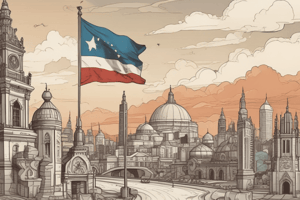Podcast
Questions and Answers
What was the VAT rate increase effective from February 1, 2020?
What was the VAT rate increase effective from February 1, 2020?
- 5% to 7.5% (correct)
- 5% to 10%
- 6% to 9%
- 4% to 6%
Which of the following is NOT considered an exempt item for VAT purposes?
Which of the following is NOT considered an exempt item for VAT purposes?
- Luxury consumer goods (correct)
- Pharmaceutical products
- Basic food items
- Exported services
Who has the obligation to deduct VAT at source and remit it to the tax authority?
Who has the obligation to deduct VAT at source and remit it to the tax authority?
- Government agencies and banks only
- MTN and Airtel exclusively
- All businesses selling goods
- MTN, Airtel, banks, oil and gas companies (correct)
What mechanism was introduced by the Finance Act 2019 regarding invoices and VAT?
What mechanism was introduced by the Finance Act 2019 regarding invoices and VAT?
Which platform has been implemented by the FIRS for VAT tracking and remittance?
Which platform has been implemented by the FIRS for VAT tracking and remittance?
Which type of companies must charge and collect VAT when providing services to Nigerian customers?
Which type of companies must charge and collect VAT when providing services to Nigerian customers?
How are VAT returns filed according to the current regulations?
How are VAT returns filed according to the current regulations?
Which of the following is categorized as a zero-rated item?
Which of the following is categorized as a zero-rated item?
Study Notes
Value-Added Tax (VAT) Overview
- Current standard VAT rate is 7.5%, an increase from 5% as of 1 February 2020.
- Zero-rated items include goods and services for diplomats and humanitarian donor-funded projects.
Exempt Items
- Exemption applies to:
- Plants and machinery used in Export Processing Zones (EPZs) or Free Trade Zones (FTZs).
- Basic food items as specified in a list.
- Medical products and services.
- Pharmaceutical products.
- Books and educational materials.
- Exported services.
VAT Compliance and Collection
- Key entities (MTN, Airtel, government agencies, banks, oil and gas companies) must deduct VAT at source from suppliers and remit to tax authorities.
- Other organizations must collect VAT from customers and file payments to tax authorities.
- The Finance Act 2019 introduced a reverse-charge mechanism for certain services lacking a tax invoice.
Filing and Remittance
- VAT returns are filed on a cash basis.
- The Federal Inland Revenue Service (FIRS) has developed FIRS VAT-Collect for automatic VAT tracking and remittance.
- Domestic airlines and certain retailers utilize this system for instant VAT remittance on ticket sales.
Non-Resident Digital Companies
- Non-resident digital companies providing services to Nigerian customers are obligated to charge and collect VAT.
- They must remit VAT to the FIRS in the currency of the transaction.
Studying That Suits You
Use AI to generate personalized quizzes and flashcards to suit your learning preferences.
Description
This quiz delves into the intricacies of Value-Added Tax (VAT), focusing on the standard rate, zero-rated items, and exemptions. Learn about the applications of VAT in various sectors and the essential goods and services affected by it. Enhance your understanding of taxation principles and their implications.




